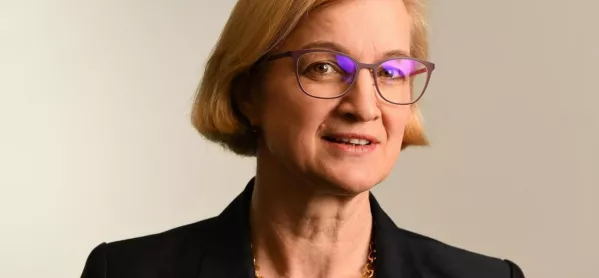Ofsted chief Amanda Spielman has expressed regret that inspectors were not able to go back into schools more quickly after the Covid crisis forced a halt to the watchdog’s activities.
Speaking at the Festival of Education today, Amanda Spielman said she “slightly wished” Ofsted had not been “completely out of schools” in the summer of 2020 when inspections were still on hold because of the pandemic.
When asked if schools went back at the right time, she said it was “absolutely right” to start visiting schools again. “I slightly wish we hadn’t been completely out of schools in summer 2020; I know how difficult the public health context was.
“I think we could have potentially done more to gather insights into all the different things that schools were offering and doing in that period.”
She said that when Ofsted started its autumn visits, in the September of 2020, inspectors had found that staff in schools were “very lonely and cut off”, and had not had the chance to talk to anybody.
Ofsted inspections were put on hold in March of 2020 as the Covid pandemic hit. They returned to schools in the autumn of 2020 with a programme of visits, which were not graded inspections.
At the time, school leaders’ unions voiced concern about plans to publish a letter detailing Ofsted’s findings about each school visit.
Ofsted then resumed its full inspection programme in September 2021, after Covid rates twice delayed its return date.
Shortly after it went back into schools last year, a support service for school leaders warned that graded Ofsted inspections during the Covid pandemic were “toxic” to the wellbeing of headteachers and should be stopped.
Teachers should not be ‘campaigners’
Ms Spielman’s speech also touched on the Department for Education’s guidance on political impartiality in her keynote speech, saying teachers should not be “campaigners” and should be “expert guides through disputed territory”.
The DfE’s guidance to “safeguard political neutrality” in schools was published in February this year.
The former education secretary, Nadhim Zahawi, said the guidance would help teachers to avoid “promoting contested theories as fact”.
And today, Ms Spielman said that balance demanded for teachers not to be “campaigners” where “matters are contested”.
She added that was “very often the case” when discussions divert “from the problem to the solution”.
Furthermore, Ms Spielman said that “even when there is consensus on a desirable social or economic goal”, there are “nearly always competing solutions”, which are “often hotly advocated”.
“A teacher’s impartiality truly helps young people.”
Ms Spielman said that is a “challenge for teachers” when misinformation becomes accepted because “everyone is sharing it”, but that it is ”also a great opportunity to tackle misinformation head-on and make children more savvy about the content they come across”.
“The more knowledge children possess, the easier it is for them to spot what’s real and what’s fake, and to question sources of information,” she said.
She also warned that it was ”unhealthy” for pupils’ views to mirror those of a teacher and said that it would be “worrying” for a pupil’s opinions to “emerge fully formed from an echo chamber made up of their peers and online influencers”.
Ms Spielman added that while it was “no easy task”, teachers have to find ways to “introduce different perspectives and to promote debate and discussion, but in a way that doesn’t result in conflict or encourage further polarisation”.




